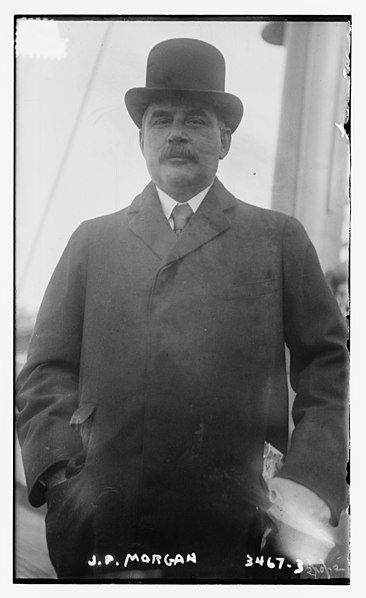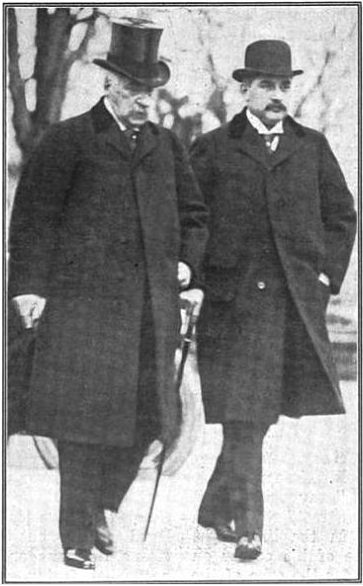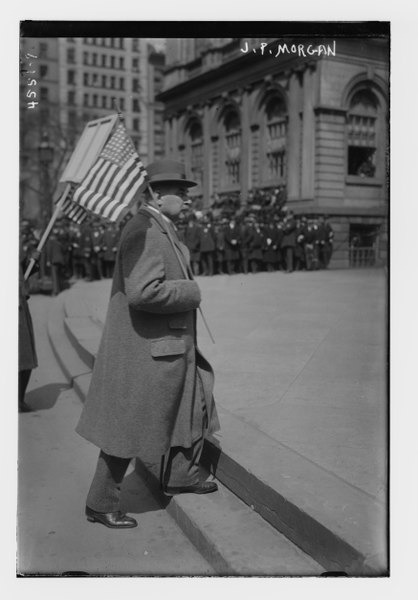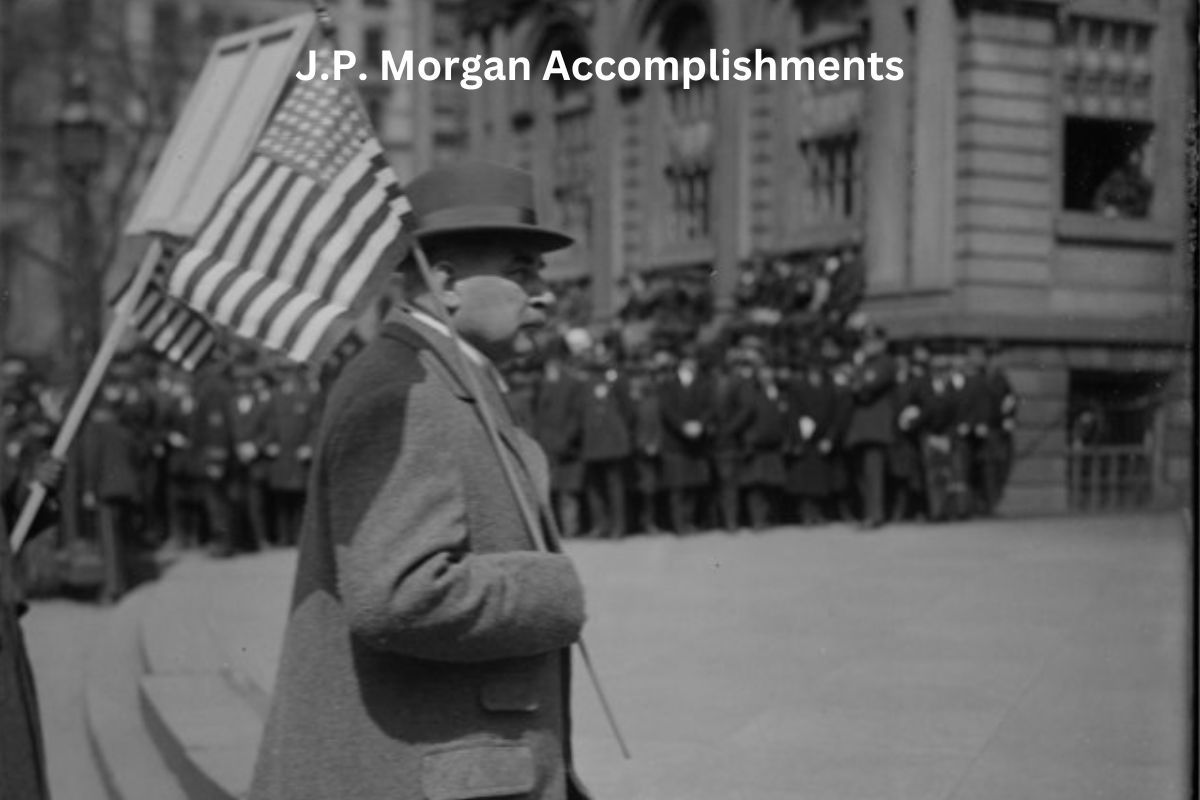J.P. Morgan, born John Pierpont Morgan in 1837, was a prominent American financier and banker who played a pivotal role in shaping the modern financial landscape of the late 19th and early 20th centuries.
His accomplishments spanned a wide range of areas, including banking, crisis management, industrial consolidation, philanthropy, and international diplomacy.
In this brief overview, we will delve into some of his most significant accomplishments that define his enduring legacy.
Accomplishments of J.P. Morgan
1. Formation of J.P. Morgan & Co
In 1871, J.P. Morgan partnered with Anthony Drexel to establish the banking firm Drexel, Morgan & Co. This marked the beginning of his prominent career in finance.
Over time, the firm evolved into J.P. Morgan & Co., one of the most influential financial institutions in the United States.
Also Read: Facts About J.P. Morgan
The firm provided a wide range of financial services, including underwriting securities, managing trusts, and advising on corporate mergers and reorganizations.

2. Crisis management during the Panic of 1907
J.P. Morgan’s most famous accomplishment in this regard was his role in quelling the Panic of 1907, a severe financial crisis that threatened the stability of the U.S. banking system.
Morgan personally organized a group of bankers who pledged their own funds to stabilize the stock market and prevent bank failures.
His efforts were instrumental in calming the panic and restoring confidence in the financial markets. This crisis management demonstrated his extraordinary influence and financial acumen.
3. Creation of U.S. Steel Corporation
In 1901, J.P. Morgan orchestrated a historic merger that led to the formation of the United States Steel Corporation.
This merger combined several major steel companies, including Carnegie Steel Company, Federal Steel Company, and National Steel Company, into one giant corporation. U.S. Steel became the world’s first billion-dollar corporation and a symbol of American industrial might.
Also Read: Timeline of J.P. Morgan
Morgan’s role in this consolidation was a testament to his ability to structure complex deals and reshape entire industries, in this case, the steel industry, which was vital to the nation’s growth.

4. Banking and financing innovations
J.P. Morgan introduced several financial innovations that had a lasting impact on the banking and finance industry:
- Trust companies: Morgan popularized the use of trust companies to hold and manage assets for clients. These trust companies provided a way for wealthy individuals and businesses to consolidate their wealth and manage it more effectively.
- Underwriting of securities: Morgan’s firm became a pioneer in underwriting securities, which involved guaranteeing the sale of stocks and bonds issued by corporations. This practice helped companies raise capital more efficiently by reducing the risk for investors.
- Issuance of stocks and bonds: J.P. Morgan & Co. played a crucial role in facilitating the issuance of stocks and bonds for corporations. This helped companies finance their expansion and infrastructure projects by tapping into the capital markets.
5. Consolidation of the railroad industry
J.P. Morgan played a significant role in consolidating the fragmented railroad industry in the late 19th and early 20th centuries. He helped reorganize and merge various railroad companies, making them more efficient and financially stable.
Notable examples include his involvement in the reorganization of the New York Central Railroad and the formation of the Northern Securities Company. These actions contributed to the development of a more streamlined and economically viable railroad system in the United States.
6. Philanthropy and art collection
J.P. Morgan was a notable philanthropist and art collector. His accomplishments in this area include:
Morgan Library & Museum: He amassed an extensive collection of rare books, manuscripts, and artwork, which formed the basis for the Morgan Library & Museum in New York City. This institution continues to serve as a cultural and educational resource.
Donations to education and cultural institutions: Morgan made significant donations to educational and cultural institutions, including universities, museums, and hospitals. His philanthropic contributions supported the advancement of education and the arts in the United States.
Promotion of art and culture: Morgan’s passion for art and culture extended beyond his personal collection. He encouraged the appreciation and support of the arts among his contemporaries, leaving a legacy of cultural enrichment that continues to benefit society to this day.

7. Role in the creation of the Federal Reserve System
J.P. Morgan played a pivotal role in the establishment of the Federal Reserve System, one of the most significant achievements in American financial history.
- Financial expertise: Morgan’s extensive knowledge of banking and finance made him a valuable advisor during the drafting of the Federal Reserve Act of 1913. He provided valuable insights into designing a central banking system that would stabilize the U.S. economy.
- Advocacy for central banking: Morgan advocated for the creation of a central bank to serve as a lender of last resort during financial crises, drawing from his experience in managing financial panics.
- Influence on the legislation: Although the Federal Reserve Act was primarily authored by political figures and economists, Morgan’s reputation and influence in the financial world lent credibility and support to the idea of establishing the Federal Reserve.
8. International financial diplomacy
J.P. Morgan’s financial acumen and influence extended beyond U.S. borders.
Venezuelan Crisis (1902-1903): Morgan helped mediate a dispute between European nations and Venezuela over unpaid debts. His negotiations led to a peaceful resolution that prevented military conflict.
Russo-Japanese War (1904-1905): Morgan played a role in facilitating loans to Japan during the war against Russia, contributing to Japan’s successful prosecution of the conflict and the subsequent Treaty of Portsmouth.

9. Support for infrastructure development
J.P. Morgan provided crucial financial support for significant infrastructure projects in the United States, including:
Panama Canal: He assisted in the financing of the construction of the Panama Canal, a vital waterway that connected the Atlantic and Pacific Oceans. This project had far-reaching implications for global trade and transportation.
New York City subway system: Morgan helped secure funding for the development of the New York City subway system, which greatly improved urban transportation and infrastructure in the city.
10. Legacy in banking and finance.
J.P. Morgan left a lasting legacy in the world of banking and finance:
Continued influence: Even after his death, J.P. Morgan & Co. remained a prominent financial institution and played a significant role in shaping the American economy for many years.
Development of modern finance: Morgan’s innovative financial practices, such as trust companies, underwriting, and securities issuance, contributed to the modernization of the financial industry and established many of the practices that are still in use today.
Recognition as a financial titan: J.P. Morgan is remembered as one of the most powerful and influential figures in American finance and is often regarded as a symbol of the Gilded Age and the transformation of American business and finance during his era.
